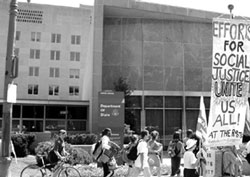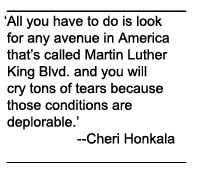
WASHINGTON (FinalCall.com) – As thousands gathered at the Lincoln Memorial Aug. 23 to commemorate the 40th anniversary of Martin Luther King Jr.’s “I Have A Dream” speech to the historic March on Washington for Jobs and Freedom, another of Dr. King’s important milestones did not go without notice.
This summer marks the 35th anniversary of the Poor People’s Campaign with its “Resurrection City” tent-encampment on the National Mall, which Dr. King launched, but did not live to see.
Hundreds of homeless women and their children, transient men, along with a cadre of students who rallied to the cause, completed a three-week march from the Mississippi Delta to join the March on Washington celebration.
Led by activists from Philadelphia’s Kensington Welfare Rights Union (KWRU), they erected their own tent-city–called “Bushville”–near the Washington Monument to dramatize their complaints about the lack of healthcare, affordable housing, and to demand an end to poverty and what they call “economic injustice” in this country.

“So we, the people that have no healthcare, those of us that are going to lose our children if we can’t find affordable housing, and those of us that have served time in the military and are denied the basic necessities of life, we’re setting up Bushville today,” Cheri Honkala, spokesperson for this year’s Poor People’s March for Economic Human Rights, told reporters during an impromptu press conference as they marched past the Lincoln Memorial. “We’re setting up a Resurrection City and calling it ‘Bushville’ after the Bush administration.
“We’re bringing together people of all walks of life and all colors to call for an end to poverty and economic injustice in our country. I live in Philadelphia, in an area where all the factories have closed down,” said the 40-year-old activist, who also said her two sons also participated in the march, which began on Aug. 2 in Marks, Miss., the place where the original Poor People’s Campaign began in 1968.
About 100 demonstrators left Marks and proceeded through Kentucky, Georgia, North Carolina, West Virginia, and Virginia on their way to the nation’s Capitol. “Our country does a great job of hiding poverty, and we are going to shine a light on it,” Ms. Honkala said before leaving Mississippi, according to a published report. “We will be visible in every state we pass through.” In Mississippi, this year’s marchers met some of the original participants in the 1968 Poor People’s Campaign.
“There are millions of poor people in this country who have very little, or even nothing to lose,” Dr. King said of the original Poor People’s Campaign before his assassination in Memphis on April 4, of that year. “If they can be helped to take action together, they will do so with a freedom and a power that will be a new and unsettling force in our complacent national life.”
The irony contained in the mixed images of Dr. King’s work on behalf of the poor, and the accolades which have now become part of his legacy, is also an important symbol for this year’s poor people’s campaign. “All you have to do is look for any avenue in America that’s called Martin Luther King Blvd. and you will cry tons of tears because those conditions are deplorable,” Ms. Honkala told The Final Call. “There’s no reason that we should have this kind of poverty, not this time in history. And I think that if Dr. King was here today, he would be marching with poor brothers and sisters across the country.”
Joining the marchers on their final leg–from the Iwo Jima Memorial near Arlington National Cemetery, past chic sidewalk cafes and George Washington University Hospital in Washington’s affluent Georgetown section–were more than a dozen taxicabs, representing the 600-member Alexandria United Taxi Cab Drivers Association.
“Martin Luther King gave freedom. He sacrificed himself for freedom of Black people and freedom of all poor people. All 600 taxidrivers in Alexandria, we don’t have that freedom. We are sharecropping, like old-time,” Melagueta Emos, spokesman for the Alexandria United Taxi Cab Drivers Association told The Final Call.
“The city gives us license, but they give the permit to the company,” he complained pointing out that taxi companies force them to “pay them every month like, I don’t know, like Mafia, sharecropping.
“They are collecting welfare money from us and they don’t provide anything to us,” said Mr. Emos, who came to this country from Ethiopia 20 years ago, and has driven a taxi for the last six years.
While Poor People’s Campaign organizers planned a full week of activities–including free medical examinations, marches and panel discussions on the right to healthcare, housing, food, and education, all centered around their tent-city on the National Mall–their plans were disrupted early on the morning of Aug. 24 when U.S. Park Police arrested 17 activists and dismantled “Bushville.”
A Park Police spokesman said that officers told 75 Bushville “residents” that their permit to remain on the Mall expired at midnight Aug. 23 before arresting 17 of them, according to a published report. Those arrested were issued misdemeanor citations and given court dates.
Lawyers and organizers planned to contest the legal charges and continued to negotiate for an extended permit for Bushville, a campaign spokesperson said at Final Call press time, indicating that a local church–St. Stephens Church of the Incarnation, three miles away–had opened its doors to the activists to continue their week-long Washington campaign.












